冠词、介词用法
冠词和介词

方位介词:用来表示物体位置的介词。
常见的方位介词:
in 在大地方/ 在...里 at 在小地方
in front of 在...前面 behind 在...后面 between 在两者之间
2. There is ____ famous college in our city.
3. Everybody has ____ mouth and ___ nose.
4. Which one is bigger,____sun or____moon?
5. Lucy is _____English girl and I am ___Chinese girl.
on 接触表面 over 在垂直正上方 above 在上方
inside 在...里面 outside 在...外面
under 在垂直正下方 below 在下方
next to 紧挨着 beside 在...旁边 near 在...附近
谢谢观赏
注意:在元音音素前用an,在辅音音素前用a.元音音素可不 等同于元音字母。如:1.一个小时an hour;
2.一所大学 a university
the:我们在谈到之前提过的某人或某物时,或特 指某人或某物时,常在其前用定冠词the.
I have a pen. The pen is red. Do you know the girl in black?
注意:一般来说,球类运动前不加the,乐器前加the,我们 所学过的序数词,最高级,方向等前也要加the. 1.踢足球 2.弹钢琴 3.第二个 4.最大的一个 5.新乡在河南的北面
初高中衔接冠词、代词及介词基本用法
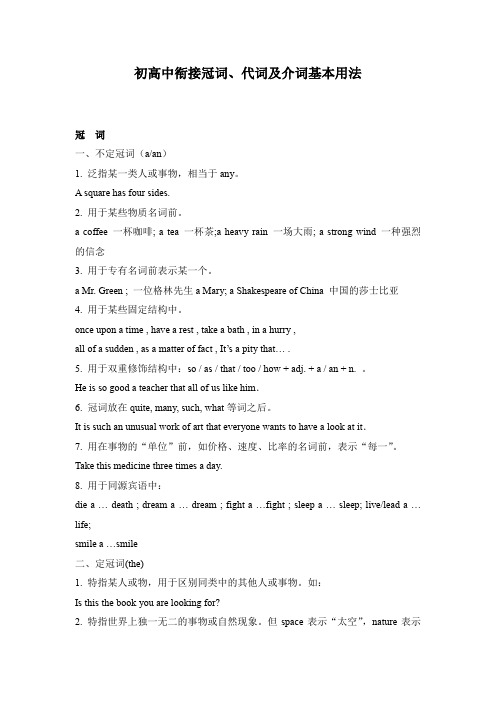
初高中衔接冠词、代词及介词基本用法冠词一、不定冠词(a/an)1. 泛指某一类人或事物,相当于any。
A square has four sides.2. 用于某些物质名词前。
a coffee 一杯咖啡; a tea 一杯茶;a heavy rain 一场大雨; a strong wind 一种强烈的信念3. 用于专有名词前表示某一个。
a Mr. Green ; 一位格林先生a Mary; a Shakespeare of China 中国的莎士比亚4. 用于某些固定结构中。
once upon a time , have a rest , take a bath , in a hurry ,all of a sudden , as a matter of fact , It’s a pity that… .5. 用于双重修饰结构中:so / as / that / too / how + adj. + a / an + n. 。
He is so good a teacher that all of us like him.6. 冠词放在quite, many, such, what等词之后。
It is such an unusual work of art that everyone wants to have a look at it.7. 用在事物的“单位”前,如价格、速度、比率的名词前,表示“每一”。
Take this medicine three times a day.8. 用于同源宾语中:die a … death ; dream a … dream ; fight a …fight ; sleep a … sleep; live/lead a … life;smile a …smile二、定冠词(the)1. 特指某人或物,用于区别同类中的其他人或事物。
如:Is this the book you are looking for?2. 特指世界上独一无二的事物或自然现象。
中考语法知识点整理冠词代词与介词用法

中考语法知识点整理冠词代词与介词用法冠词、代词与介词是中考语法中非常重要的知识点。
正确的运用冠词、代词和介词能够使句子表达更加准确、通顺。
下面将对冠词、代词与介词的用法进行整理,希望对大家在中考语法复习中有所帮助。
一、冠词的用法1. 定冠词“the”定冠词“the”用于特指某一事物或人。
例如:- The book on the table is mine. (桌子上的那本书是我的。
)- The girl who is singing is my sister. (正在唱歌的那个女孩是我妹妹。
)2. 不定冠词“a/an”不定冠词“a/an”用于泛指某一事物或人。
例如:- I have a book. (我有一本书。
)- She wants to be an actress. (她想成为一名演员。
)3. 零冠词(不使用冠词)零冠词用于泛指一般事物或人。
例如:- Cats are cute. (猫很可爱。
)- Dogs are loyal animals. (狗是忠诚的动物。
)二、代词的用法1. 人称代词人称代词用来代替特指或泛指的人。
例如:- He is my friend. (他是我的朋友。
)- I saw them at the park yesterday. (昨天我在公园看到了他们。
)2. 物主代词物主代词用来表示所有关系。
例如:- This is his pen. (这是他的钢笔。
)- Our house is big. (我们的房子很大。
)3. 反身代词反身代词用来表示动作的主体和受体是同一个人或物。
例如:- She hurt herself while playing basketball. (她在打篮球的时候受伤了。
)- We should take care of ourselves. (我们应该照顾好自己。
)三、介词的用法1. 表示位置关系的介词- in:表示在某个范围或限定的区域内。
介词的用法区别、冠词、数词、名词、形容词、动词
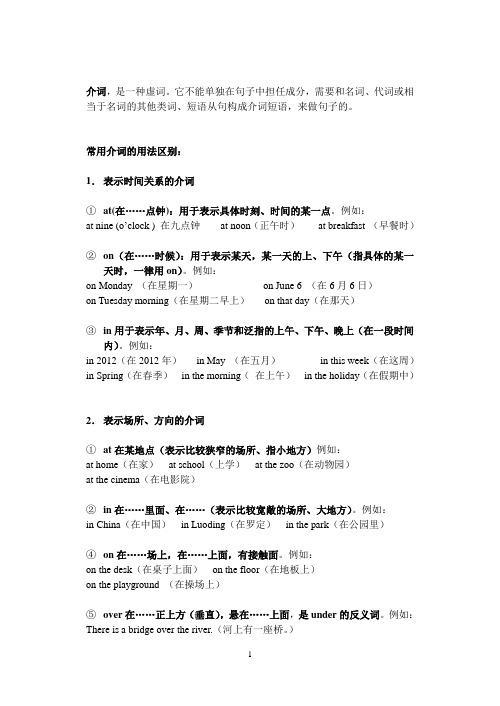
介词,是一种虚词。
它不能单独在句子中担任成分,需要和名词、代词或相当于名词的其他类词、短语从句构成介词短语,来做句子的。
常用介词的用法区别:1.表示时间关系的介词①at(在……点钟):用于表示具体时刻、时间的某一点。
例如:at nine (o’clock ) 在九点钟at noon(正午时)at breakfast (早餐时)②on(在……时候):用于表示某天,某一天的上、下午(指具体的某一天时,一律用on)。
例如:on Monday (在星期一)on June 6 (在6月6日)on Tuesday morning(在星期二早上)on that day(在那天)③in用于表示年、月、周、季节和泛指的上午、下午、晚上(在一段时间内)。
例如:in 2012(在2012年)in May (在五月)in this week(在这周)in Spring(在春季)in the morning(在上午)in the holiday(在假期中)2.表示场所、方向的介词①at在某地点(表示比较狭窄的场所、指小地方)例如:at home(在家)at school(上学)at the zoo(在动物园)at the cinema(在电影院)②in在……里面、在……(表示比较宽敞的场所、大地方)。
例如:in China(在中国)in Luoding(在罗定)in the park(在公园里)④on在……场上,在……上面,有接触面。
例如:on the desk(在桌子上面)on the floor(在地板上)on the playground (在操场上)⑤over在……正上方(垂直),悬在……上面,是under的反义词。
例如:There is a bridge over the river.(河上有一座桥。
)冠词、数词冠词要用在名词前面,用来说明名词所指的人或事物是泛指还是特指。
冠词是一种虚词,不能单独作句子成分。
冠词分为不定冠词a/an和定冠词the。
冠词和方位介词的讲解

冠词(a,an,the),方位介词的用法I、冠词分为不定冠词(a, an),定冠词(the),和零冠词。
一、不定冠词(a/an)的用法:a用于辅音前;an用于元音前。
请注意以下2点:1. 拼写以辅音字母开头读音却以元音开头的单词hour['ɔnə], honest, honor等单词的拼写虽然以辅音字母h开头,但其读音却以元音开头,因此,前面要用等单词的拼写虽然以辅音字母an。
可熟记下面这句话:An hour ago, an honest man accepted an honorable task. (一小时前,一位诚实的人接受了一项光荣的任务。
2.拼写以元音字母开头读音却以辅音开头的单词useful ['ju:sful], university, usual, European, united, one-eyed['wʌn'aid], one-way等单词的拼写虽然以元音字母开头,但其读音却以元音开头,因此,前面要用a等单词的拼写虽然以元音字母开头,但其读音却以辅音开头。
可熟记下面这句话:In a university, a European and a one-eyed man walk along a one-way road with a usual tool. This is a usual thing. (在一所大学里,有一个欧洲人和一个独眼龙拿着有用的工具沿着一条单行道行走,这是件平常的事。
不定冠词的记忆口诀:冠词a, an两种帽,单数可数名词要;选帽只要听读音,不看字母能做到;元音因素来开头,一定需要选an帽;辅音因素带a帽,记住规律莫乱套。
二、定冠词的用法:定冠词记忆口诀:特指双方熟悉,上文已经提及;世上独一无二,方位西洋乐器;某些专有名词,外加复数姓氏;序数词最高级,习惯用语要特记。
三、零冠词的用法:零冠词记忆口诀:下列情况应免冠,代词限定名词前;专有名词不可数,学科球类三餐饭;复数名词表泛指,两节星期月份前;颜色语种和国名,称呼习语及头衔。
小学英语冠词与介词用法总结
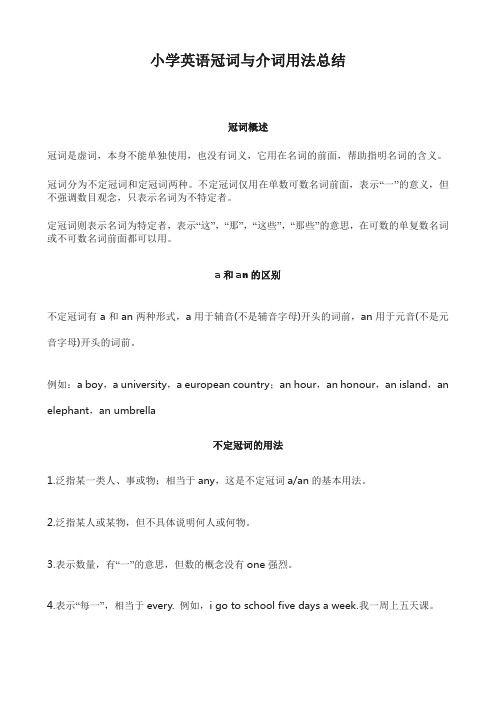
小学英语冠词与介词用法总结冠词概述冠词是虚词,本身不能单独使用,也没有词义,它用在名词的前面,帮助指明名词的含义。
冠词分为不定冠词和定冠词两种。
不定冠词仅用在单数可数名词前面,表示“一”的意义,但不强调数目观念,只表示名词为不特定者。
定冠词则表示名词为特定者,表示“这”,“那”,“这些”,“那些”的意思,在可数的单复数名词或不可数名词前面都可以用。
a和an的区别不定冠词有a和an两种形式,a用于辅音(不是辅音字母)开头的词前,an用于元音(不是元音字母)开头的词前。
例如:a boy,a university,a european country;an hour,an honour,an island,an elephant,an umbrella不定冠词的用法1.泛指某一类人、事或物;相当于any,这是不定冠词a/an的基本用法。
2.泛指某人或某物,但不具体说明何人或何物。
3.表示数量,有“一”的意思,但数的概念没有one强烈。
4.表示“每一”,相当于every. 例如,i go to school five days a week.我一周上五天课。
5.用在序数词前,表示“又一”,“再一”。
例如,i have three books. i want to buy a fourth one.我已经有三本书,我想买第四本。
6.用在某些固定词组中:a lot(of)许多,大量;after a while过一会儿定冠词的用法1.特指某(些)人或某(些)物,这是定冠词的基本用法。
2.指谈话双方都知道的人或事物。
例如:open the window,please.请打开窗户。
3.指上文已经提到的人或事物。
例如:i have a car. the car is red.我有一辆小汽车,它是红色的。
4.指世界上独一无二的事物。
例如:which is bigger,the sun or the earth?哪一个大,太阳还是地球?5.用在序数词,形容词最高级前。
冠词与介词的用法讲解及练习

冠词与介词的用法讲解一、冠词分类及其用法1.冠词的分类不定冠词:a 和an冠词定冠词: the零冠词: 不使用冠词2.不定冠词的用法(1)a用在以辅音音素开头的单词前. A useful bookan用在以元音音素开头的单词前.An egg(2)基本用法:指人或事物的某一种类e.g. She is a girl. 她是女孩.This is a desk. 这是一张书桌.(3)泛指某人或者某物,但又不具体说明何人何物.e.g. I can see a kite. 我能看见一只风筝 A boy is in Grade 1.(4)表示“数量”,“有一”“每一”的意思.e.g. We have six classes a day. 我们一天上六节课.(5)表示“同一”,相当于the samee.g The two boys are of ___an___ age.Cotton of ___a___ kind was stored together.(6)用于某些物质名词或抽象名词前,表示“一种、一类、一份、一场、一阵”.e.g That is __a__ green tea.They were caught in __a___ heavy rain.a pleasure / a success/ a failure(7)用于专有名词前表示类似的一个或某一个.e.g ______A__ Mr. Li is asking to see you at the school gate.(8)否定比较级表达最高级意义时,常用借助于不定冠词a/ an. a/ an+比较级e.g. --- What do you think of the film?--- Oh, I’ve never seen a worse one.3.定冠词的用法(1)基本用法:“特指”.特指某(些)人或者某(些)事物,以便与其他的人或物有所区别.e.g.The book on the desk is Jim’s. 书桌上的那本书是吉姆的.The chairs are there. 椅子在那里.(2)指谈话双方都知道的人或事物.e.g. Where is the kite? 风筝在哪儿?(双方都知道指的是哪只风筝.)Open the door, please.请把门打开.(双方都知道要打开哪扇门.)(3)在叙述中,上文提到过的人或者事物,再次出现时.e.g. A:I can see a kite. 我看见一只风筝B:Where is the kite?这个风筝在里?(4)用在姓氏的复数名词前,表示“一家人”e.g. the Blacks 布来克一家(5)用在宇宙间独一无二的天体名词之前.e.g.the sun the sky the moon the earth(6)用在序数词和形容词最高级,及形容词only, very, same 前.e.g. I live on the second floor.我住在二楼Skating is the best sport in winter. 滑冰是冬天最好的运动(7)用在某些建筑物和旅馆的名称之前.The Palace Museum (故宫) The Summer Palace (颐和园)(8)在江河、山脉、湖泊、海洋、群岛、海峡、海湾运河前用the。
英语一些介词和冠词的用法

英语一些介词和冠词的用法英语一些介词和冠词的用法最佳答案一、介词及介词短语介词像个“游离体”,名前动后常出现,一旦组成“某结构”,句中成分有一位。
“介+宾”叫“介短”,作“形、副”句里边。
“宾补、表、定、状”,都能用得上?。
“动+介”——动词性?,“及、不及物”谓语用。
成语、习语常固定,应用起来有弹性。
注 ?介词后面的名词、代词或数词是介词的宾语,介词和介词宾语合成介词短语。
介词短语在句中的语法作用相当于形容词或副词,在句中做宾(主)语、补足语、表语、定语或状语。
?“动词+介词(副词)”组成一个动词词组或短语动词,其语法作用相当于一个及物动词或不及物动词,在句中作谓语。
二、介词在句中的位置介词活跃句关键,短语合成形简单,独作成分看不见,介短表定状可担。
before时空在之前, after之后off远。
直上 over,above斜, under,below下相反。
直到till,on表面,穿过through,for因缘。
by表旁边in里面, with伴随by车船。
时间地点at、in、on,二者between多among,behind后面beside旁,附近near沿着along。
from来自like像,表示目的for,to当。
of所属周围round,向上up向下down。
三、on,at,in用法巧记on,at,in这三个常用介词都可以表示时间和地点,但具体用法不同,多数学生对它们混淆不清。
现在只要记住了口诀,就可避免at,on,in的种种误用。
1. on,in,at表示时间on“在具体某一天”?“当某时”,动名词, arrival,death前;用in一般“上”“下”“晚”;on用于天,in用于月、季、年?;限定三时in要变。
?at是个时间点,“工作”“时刻”与“圣诞”?。
at noon(night),in the day,习惯用语记心间。
注:?on表示在具体某一天及具体某一天的上午、下午和晚上。
例 On Mother's Day, we should sned flowers to our mother. 母亲节,我们应该送花给我们的母亲。
名、冠词、介词用法
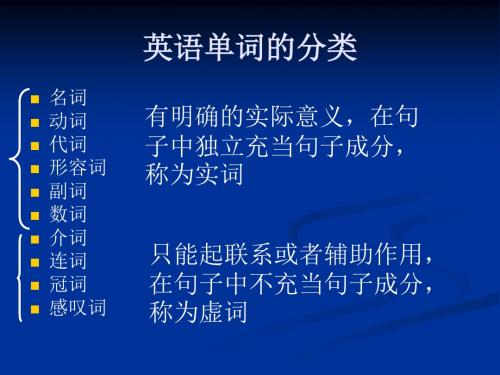
8. 不定冠词的特殊位置: (1)不定冠词用在so, too, how +形容词 的后面,修饰名词。如: Heபைடு நூலகம்is so good a boy that all of us like him. (2) 用在what, such , many 等词后: What a clever girl! Many a student is here.
1. 表示两者或两者以上共同所有,把’s 加在最后的 名词上。 如:Lucy and Lily’s friend 露西和莉莉共同的朋友 Tom and Jack’s room 汤姆和杰克合用的房间 2. 表示各自拥有某件东西时,每个名词都要用所有格 形式。 如: Lucy’s and Lily’s friends露西的朋友和莉莉的 朋友 Tom’s and Jack’s rooms 汤姆的房间和杰克的 房间
二、介词的分类:
1. 简单介词。如: at, in, on, beside, 2. 合成介词。如: inside, without, into, within 3. 短语介词。如: ahead of, because of, by means of 4. 分词介词。如: concerning, including, regarding
9. 在逢十的复数名词前,表示世纪的某个年代。如: in the 1870’s 10. 在姓氏复数名词前,表示全家或夫妻俩。如: The Greens are watching TV now. 11. 用在西洋乐器前,中国名族乐器前不加冠词。如: play the violin, play Erhu (二胡) 12. 用在江河湖海,山脉,群岛前。 如: the Yellow river, the Xisha islands
中考重点冠词介词与连词的运用
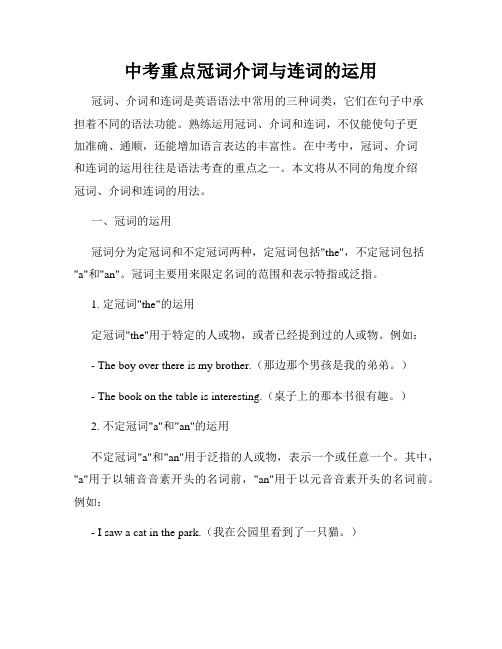
中考重点冠词介词与连词的运用冠词、介词和连词是英语语法中常用的三种词类,它们在句子中承担着不同的语法功能。
熟练运用冠词、介词和连词,不仅能使句子更加准确、通顺,还能增加语言表达的丰富性。
在中考中,冠词、介词和连词的运用往往是语法考查的重点之一。
本文将从不同的角度介绍冠词、介词和连词的用法。
一、冠词的运用冠词分为定冠词和不定冠词两种,定冠词包括"the",不定冠词包括"a"和"an"。
冠词主要用来限定名词的范围和表示特指或泛指。
1. 定冠词"the"的运用定冠词"the"用于特定的人或物,或者已经提到过的人或物。
例如:- The boy over there is my brother.(那边那个男孩是我的弟弟。
)- The book on the table is interesting.(桌子上的那本书很有趣。
)2. 不定冠词"a"和"an"的运用不定冠词"a"和"an"用于泛指的人或物,表示一个或任意一个。
其中,"a"用于以辅音音素开头的名词前,"an"用于以元音音素开头的名词前。
例如:- I saw a cat in the park.(我在公园里看到了一只猫。
)- An apple a day keeps the doctor away.(每天一个苹果,医生远离我。
)二、介词的运用介词是连接词与词、短语与短语的词类,它可以表示时间、地点、原因、方式等概念。
在句子中,介词一般位于名词或代词之前,构成介词短语。
以下是一些常用介词及其用法。
1. 表示时间的介词- at:表示具体某一时间点。
例如:at 8 o'clock(在8点)。
- in:表示某一段时间内。
例如:in the morning(在早上)。
中考介词冠词代词连词的用法总结
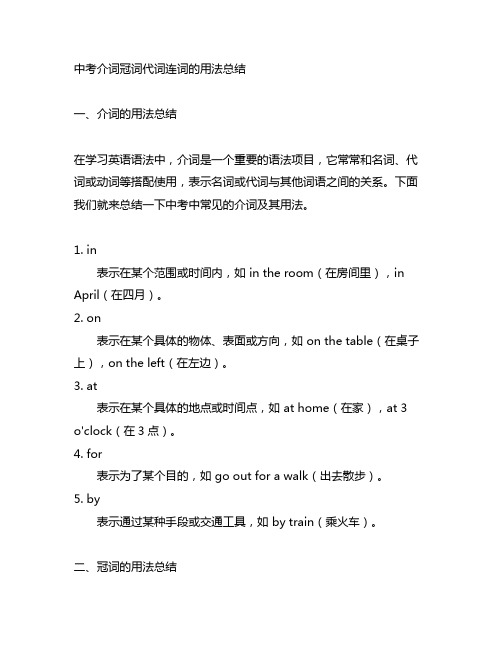
中考介词冠词代词连词的用法总结一、介词的用法总结在学习英语语法中,介词是一个重要的语法项目,它常常和名词、代词或动词等搭配使用,表示名词或代词与其他词语之间的关系。
下面我们就来总结一下中考中常见的介词及其用法。
1. in表示在某个范围或时间内,如 in the room(在房间里),in April(在四月)。
2. on表示在某个具体的物体、表面或方向,如 on the table(在桌子上),on the left(在左边)。
3. at表示在某个具体的地点或时间点,如 at home(在家),at 3 o'clock(在3点)。
4. for表示为了某个目的,如 go out for a walk(出去散步)。
5. by表示通过某种手段或交通工具,如 by train(乘火车)。
二、冠词的用法总结冠词是英语中一个比较难点的语法项目,分为定冠词“the”和不定冠词“a/an”。
下面我们来总结一下中考中常见的冠词用法。
1. 定冠词“the”表示特指,如 the sun(太阳)。
2. 不定冠词“a/an”表示泛指,如 a book(一本书)。
三、代词的用法总结代词是用来代替名词的词语,它能够减少重复,使语言更加简洁。
在中考中,代词也是一个重要的语法项目。
下面我们来总结一下中考中常见的代词及其用法。
1. 人称代词主格:I(我)、you(你)、he(他)、she(她)、it(它)、we(我们)、you(你们)、they(他们)。
宾格:me(我)、you(你)、him(他)、her(她)、it (它)、us(我们)、you(你们)、them(他们)。
形容词性:my/mine(我的)、your/yours(你的)、his(他的)、her/hers(她的)、its(它的)、our/ours(我们的)、your/yours(你们的)、their/theirs(他们的)。
2. 物主代词指代名词所有物,如 mine(我的)、yours(你的)、his(他的)、hers(她的)、its(它的)、ours(我们的)、yours(你们的)、theirs(他们的)。
冠词与介词的搭配使用技巧

冠词与介词的搭配使用技巧在英语语法中,冠词(article)和介词(preposition)是两种常用的词类,它们在句子中起着非常重要的作用。
正确的冠词和介词的搭配使用能够使句子更加通顺、表达更加准确。
下面详细介绍一下冠词和介词的搭配使用技巧。
一、冠词的搭配使用1. 不定冠词a/ana. 用于描述单数可数名词,表示泛指,比如a book(一本书)b. 用于描述某些职业、国籍等名词,比如a teacher(一位老师)、an American(一位美国人)2. 定冠词thea. 用于特指某个特定的人或物,比如the book on the table(桌子上的那本书)b. 用于特指上文已经提到过的人或物,比如I bought a book, the book is on the table(我买了本书,书在桌子上)3. 零冠词(不使用冠词)a. 专有名词通常不使用冠词,比如Mary is a teacher(玛丽是一位老师)二、介词的搭配使用1. ina. 用于表示位置、状态、时间等,比如in the classroom(在教室里)、in the morning(在早晨)b. 用于表示范围、数量等,比如in a few days(几天内)、in the distance(在远方)2. ona. 用于表示位置、表面,比如on the table(在桌子上)、on the wall(在墙上)b. 用于表示时间,比如on Monday(在周一)、on Christmas Day (在圣诞节)3. ata. 用于表示地点、场所,比如at school(在学校)、at the station (在车站)b. 用于表示时间,比如at 3 o'clock(在3点钟)、at night(在夜晚)4. ofa. 用于表示所属关系、来源、材料等,比如the book of John(约翰的书)、a cup of tea(一杯茶)5. fora. 用于表示目的、用途、受益等,比如this gift is for you(这份礼物是送给你的)、I study English for my future(我为了未来学习英语)综上所述,正确的冠词和介词的搭配使用是英语学习中的重要部分。
初中英语 冠词介词用法
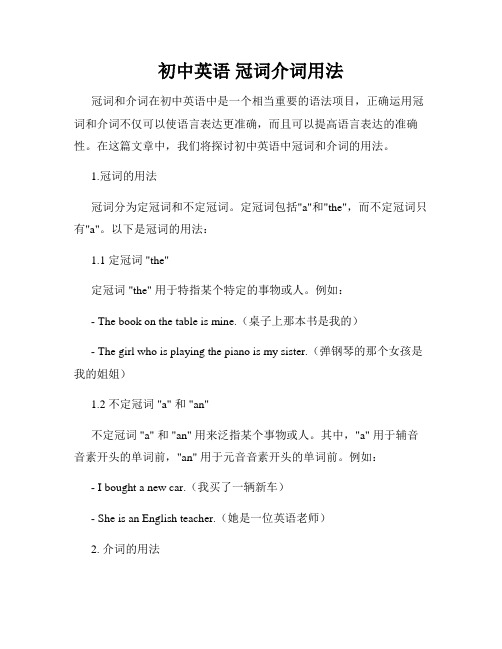
初中英语冠词介词用法冠词和介词在初中英语中是一个相当重要的语法项目,正确运用冠词和介词不仅可以使语言表达更准确,而且可以提高语言表达的准确性。
在这篇文章中,我们将探讨初中英语中冠词和介词的用法。
1.冠词的用法冠词分为定冠词和不定冠词。
定冠词包括"a"和"the",而不定冠词只有"a"。
以下是冠词的用法:1.1 定冠词 "the"定冠词 "the" 用于特指某个特定的事物或人。
例如:- The book on the table is mine.(桌子上那本书是我的)- The girl who is playing the piano is my sister.(弹钢琴的那个女孩是我的姐姐)1.2 不定冠词 "a" 和 "an"不定冠词 "a" 和 "an" 用来泛指某个事物或人。
其中,"a" 用于辅音音素开头的单词前,"an" 用于元音音素开头的单词前。
例如:- I bought a new car.(我买了一辆新车)- She is an English teacher.(她是一位英语老师)2. 介词的用法介词可以表示时间、地点、方式、原因等等。
以下是一些常用的介词及其用法:2.1 表示时间的介词- on:表示某一具体的日期或星期几。
例如:on Monday(在周一)、on June 5th(在6月5日)- at:表示某一具体的时刻。
例如:at 8 o'clock(在8点钟)- in:表示一段时间、一个季节或年代。
例如:in the morning(在早上)、in summer(在夏天)、in the 1990s(在20世纪90年代)2.2 表示地点的介词- in:表示在某个较大的地方范围内。
第二讲 冠词、介词(短语)
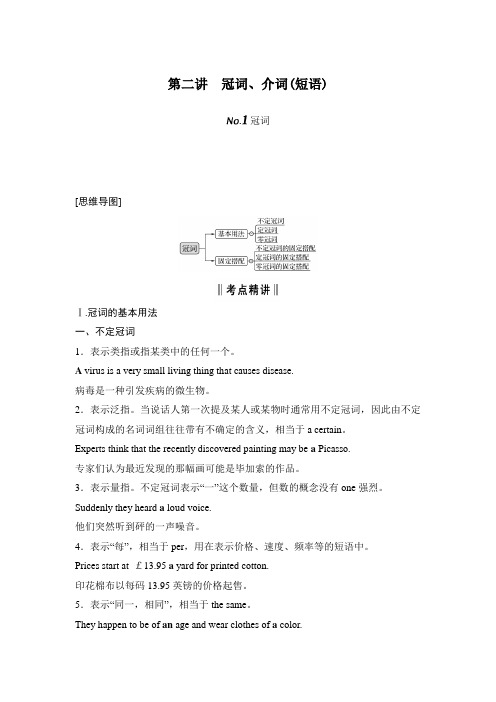
第二讲冠词、介词(短语)冠词[思维导图]Ⅰ.冠词的基本用法一、不定冠词1.表示类指或指某类中的任何一个。
A virus is a very small living thing that causes disease.病毒是一种引发疾病的微生物。
2.表示泛指。
当说话人第一次提及某人或某物时通常用不定冠词,因此由不定冠词构成的名词词组往往带有不确定的含义,相当于a certain。
Experts think that the recently discovered painting may be a Picasso.专家们认为最近发现的那幅画可能是毕加索的作品。
3.表示量指。
不定冠词表示“一”这个数量,但数的概念没有one强烈。
Suddenly they heard a loud voice.他们突然听到砰的一声噪音。
4.表示“每”,相当于per,用在表示价格、速度、频率等的短语中。
Prices start at £13.95 a yard for printed cotton.印花棉布以每码13.95英镑的价格起售。
5.表示“同一,相同”,相当于the same。
They happen to be of an age and wear clothes of a color.他们碰巧同龄而且穿着同样颜色的衣服。
6.用在某些物质名词或抽象名词前,使之具体化。
这样的物质名词有:rain,snow,fog,wind,drink,coffee,beer,fire,paper等;抽象名词有:success,failure,surprise,pleasure,beauty,wonder,comfort,danger,shock等。
He suddenly appeared on a rainy night,which was a great surprise to us.他在一个雨夜突然出现,这使我们非常吃惊。
介词和冠词在句子中的位置和用法

介词和冠词在句子中的位置和用法在英语句子中,介词和冠词是两个重要的语法成分,它们在句子中的位置和用法对于句子的意思和表达都有着重要的影响。
本文将详细介绍介词和冠词在句子中的位置和用法。
一、介词的位置和用法介词是一种虚词,用来表示名词或代词与其他成分之间的关系。
介词通常位于名词或代词之前,连接名词或代词与其他成分。
1. 介词的位置介词通常位于名词或代词之前,例如:- I went to the park.(我去了公园。
)- He is studying for the exam.(他正在备考。
)2. 介词的用法介词可以表示时间、地点、原因、目的等不同的意义。
以下是一些常用的介词及其用法:- In(在):用于表示时间、地点等,例如:in the morning(在早上)、in the city(在城市中)。
- On(在、在上面):用于表示时间、地点等,例如:on Monday (在星期一)、on the table(在桌子上)。
- At(在、在...时候):用于表示时间、地点等,例如:at 7 o'clock (在7点钟)、at the airport(在机场)。
- With(和):用于表示伴随、方式等。
例如:I went to the cinema with my friends.(我和我的朋友一起去了电影院。
)二、冠词的位置和用法冠词是一种限定词,用来限定名词或名词短语的用法,包括定冠词(the)和不定冠词(a/an)两种。
1. 定冠词的位置定冠词the通常位于名词之前,例如:- The book is on the table.(这本书在桌子上。
)- The boy is playing in the park.(那个男孩在公园里玩。
)2. 不定冠词的位置不定冠词a/an通常位于名词之前,例如:- I saw a cat on the street.(我在街上看到一只猫。
)- She wants to be an actress.(她想成为一名演员。
英语冠词、介词知识总结

on purpose by chance catch/on fire at dawn/dusk face to face in debt make room for out of date heart and soul in danger in return day by day in place
As is known to us,Russia is a European country.
2. 不定冠词a/an放在单数可数名词前,泛指一个人或一个事物。 They found an apartment in America where they lived only half a year.
3. 表示泛指。说话人第一次提及某人或某物时通常用不定冠 词。
5. 用在表示计量的名词前,表示按…计算,如by the hour,by the day,by the week,by the dozen,by the yard等,但是如表示单位的 名词为不可数名词,之前不用冠词,如by weight/height等。
As far as I know, he will get paid by the week.
3. 有无冠词意义不同的搭配
at table在吃饭
at
the
table在桌子旁
in hospital住院
in
the
hospital在医院里
at school在上学
at
the
school在学校
in charge of掌管
in
the
charge
of在……掌管之中
out of question毫无疑问
out
in/after+时间段
在 …… 之 后 。 “in + 时 间 段 ” 常 与 将 来 时 连 用 ; “after+时间段”常与过去时连用
图说英语表解语法:冠词,连词,介词

图说英语:冠词,连词,介词
冠词
英语中有a,an,和the这三个冠词, a/an为不定冠词, the是定冠词。
有时名词前不用冠词称为零冠词。
冠词是一种虚词, 不能单独作句子成分, 只能放在名词前面, 帮助说明这个名词的含义。
一、冠词的类别和最基本用法
二、不定冠词的使用场合
定冠词的使用场合
三、
四、不用冠词(零冠词)的情况
五、冠词的位置
六、差之一冠, 意差千里
有些词组中, 有无冠词, 意义相处很多, 甚至相反, 常见的词组有:
连词
连词是连接单词短语或句子的一种虚词, 在句子中不单独作句子成分,一般不重读,按照性质分并列连词和从属连词.
一、连词的分类及使用
二、几组常用连词的比较
三、几组较为特殊的连词:
第五章介词
介词是一种虚词, 不能重读, 也不能单独作句子成分, 通常用于名词或相当于名词的词及代词前, 表示其后的词语与句中其他词之间的关系。
介词和名词或代词构成介词短语。
介词短语才能作句子成分。
介词后面的名词或代词称为介词的宾语, 其后的代词需用宾格。
一、介词的分类
二、介词宾语的类型
三、介词短语的句法功能
四、介词和其他词类的搭配
五、易混用的介词短语
六、介词的省略。
冠词、介词、名词所有格的用法

冠词、介词、名词所有格的用法冠词a、an、the的用法一、知识回顾1、a、an的用法a或an与可数名词单数连用,泛指某类人或某物中的一个。
This is a cat.这是一只猫。
It's an English book. 这是一本英语书。
His father is a worker.他的爸爸是个工人。
2、the的用法the既可以用在可数名词前,也可以用在不可数名词前,表示某个或某些特定的人或事物,也可以指上文提到过的人或事物。
Who's the boy in the hat? 戴帽子的男孩是谁呀,-- What can you see in the classroom? -- 你能在教室里看到什么呀, -- I can see a bag. -- 我能看见一个书包。
-- Where's the bag? -- 书包在哪呀,-- It's on the desk. -- 在桌子上。
二、典型例题例1:在必要的地方用冠词填空。
We can see_______sun, _______moon, _______ ship, _______train and a bridgein_______picture.分析:不定冠词a和an表示泛指,定冠词the表示特指。
a用于辅音音素开头的字母或单词前面;an用于元音音素开头的字母或单词前面;定冠词the表示某个或某些特定的人或事物,或是说话人与听话人双方都知道的人或事物;此外,the 还用在世界上独一无二的物体前面。
解答:the,the,a,a,the———————————————————————————————————————————————————————例2:Look at ____c ar over there. It’s ___English car.分析:特指说话双方都知道的事物,应使用定冠词。
故第一空应用the,第二空不强调数量,泛指汽车中的一种,故应用不定冠词。
英语定冠词the,介词at,in,on,for的用法
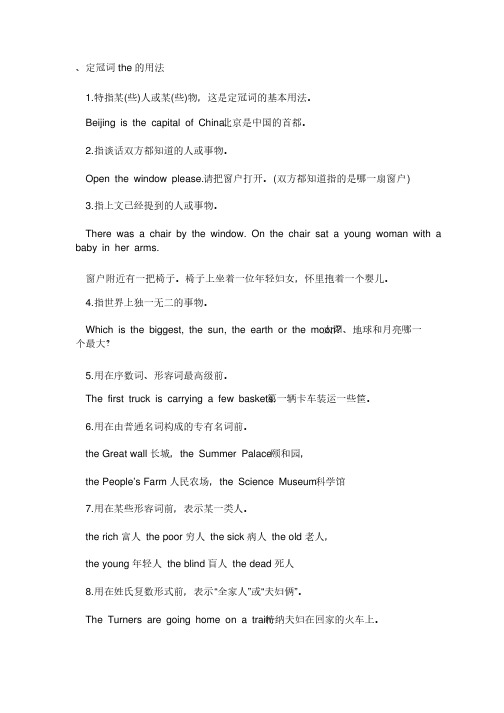
、定冠词the 的用法的用法1.特指某(些)人或某(些)物,这是定冠词的基本用法。
物,这是定冠词的基本用法。
Beijing is the capital of China. 北京是中国的首都。
北京是中国的首都。
2.指谈话双方都知道的人或事物。
指谈话双方都知道的人或事物。
Open the window please. 请把窗户打开。
请把窗户打开。
(双方都知道指的是哪一扇窗户)3.指上文已经提到的人或事物。
指上文已经提到的人或事物。
There was a chair by the window. On the chair sat a young woman with a baby in her arms.窗户附近有一把椅子。
椅子上坐着一位年轻妇女,怀里抱着一个婴儿。
4.指世界上独一无二的事物。
指世界上独一无二的事物。
Which is the biggest, the sun, the earth or the moon? 太阳、地球和月亮哪一个最大?个最大?5.用在序数词、形容词最高级前。
用在序数词、形容词最高级前。
The first truck is carrying a few baskets. 第一辆卡车装运一些筐。
第一辆卡车装运一些筐。
6.用在由普通名词构成的专有名词前。
用在由普通名词构成的专有名词前。
the the Great Great Great wall wall 长城,the Summer Palace 颐和园,颐和园,the the People’s People’s People’s Farm Farm 人民农场,the Science Museum 科学馆科学馆7.用在某些形容词前,表示某一类人。
用在某些形容词前,表示某一类人。
the the rich rich 富人the the poor poor 穷人the the sick sick 病人the the old old 老人,老人,the the young young 年轻人the the blind blind 盲人the the dead dead 死人死人8.用在姓氏复数形式前,表示“全家人”或“夫妇俩”。
- 1、下载文档前请自行甄别文档内容的完整性,平台不提供额外的编辑、内容补充、找答案等附加服务。
- 2、"仅部分预览"的文档,不可在线预览部分如存在完整性等问题,可反馈申请退款(可完整预览的文档不适用该条件!)。
- 3、如文档侵犯您的权益,请联系客服反馈,我们会尽快为您处理(人工客服工作时间:9:00-18:30)。
英语介词的用法介词是一种用来表示词与词, 词与句之间的关系的词。
在句中不能单独作句字成分。
介词后面一般有名词代词或相当于名词的其他词类,短语或从句作它的宾语。
介词和它的宾语构成介词词组,在句中作主语, 状语,表语,补语或介词宾语。
例如:Most of the students went to the classroom.大部分学生去了教室。
We play basketball on the sports ground.我们在操场上打蓝球。
介词常与动词,形容词,名词一起构成固定搭配。
belong to 属于rely on 依靠talk to 同...谈话be afraid of 害怕be strict with对...严格介词一般放在名词之前。
但它后面的介词宾语是疑问代词,疑问副词或者关系代词时,这些词提到了前面而只剩下介词在后了。
Where do you come from?你是哪儿人?Who are you talking to?你在跟谁谈话呢?What do you study for?你为了什么而学习?介词在英语词汇中所占比例很小,但它们的用法却非常灵活,复杂。
下列为常用介词及含义:about 关于,附近,大约,周围,随身.I have bought a book about Shakespearean.我买了一本有关莎士比亚的书。
There are about fifteen trees in the picture.图片里大约有十五棵树。
above 在....上,高出,以上,超过,在...上游.The plane is flying above the clouds.飞机在云上飞行。
I think the man is above sixty years old.我想那人有六十多岁了。
across 横过,对面,交叉,在...的对面.Can you swim across the river?你能游过河吗?We live across the street.我们住在街的对面。
after 在...后面,依照.He went home after school.他放学后就回家了。
Read after me, please.请跟我朗读。
against 撞到,靠着,反对,违背,The car hit against the tree.汽车撞了树。
He is standing against the wall.他靠墙站着。
along 沿着,顺着.They are walking along the river.他们沿着河行走。
among 在...当中.He is the tallest among them.他是他们当中个子最高的。
around 在...的周围,在...那一边.They sat around the table talking the news.他们绕桌而坐谈论新闻。
There is a drugstore around the corner.拐角处有一家药店。
as 作为.He doesn't like people treat him as a child.他不喜欢人们把他当小孩子对待。
at 在...时刻,在...点钟,在...岁时, 向,在...之中,按...速度,值(卖)...钱, He always gets up at six in the morning.他时常早上六点钟起床。
He shot at the bird but missed it.他向鸟射击,但是没射中。
The car goes at eighty miles an hour.汽车以每小时八十公里的速度行驶。
before 在...的前面(位置),在...之前(时间)He took a picture before the car.他在汽车前照了张照片。
He can't finish his work before supper.晚饭前他完不成工作。
behind 在...的后面(位置), 落后于,不如,迟于,晚于(时间)Are there any brooms behind the door.门后有扫帚吗?All of us are behind him in mathematics.我们数学都不如他。
介词after与behind的区别两者均可表示“在……之后”,其区别是:1.after 主要用于时间或次序,behind 主要用于位置。
如:He decided to leave after lunch. 他决定午饭后离开。
Summer comes after spring. 春去夏来。
The hospital is behind the post office. 医院在邮局后面。
注:behind 有时也用于时间,表示“迟于”,主要用于behind time(迟,晚)这一习语。
如:The train was 20 minutes behind time. 火车晚点20 分钟。
2.两者都可用于引申义,after 侧重指追求、寻找、模仿等;而behind 则侧重指在背后、支持、落后等。
如:The police are after her. 警察在追捕她。
Many young people are after her. 许多年青人都追求她。
We are behind you completely. 我们完全支持你。
He is behind the others in maths. 他的数学不如别人。
below 在...之下,低于,There are four lights below the ceiling.天花板下面有四盏灯。
The murderer run away below the police's eyes.杀人犯从警察眼皮底下跑了。
beside 在...的旁边,在...之外,与...相比.He found the body by the river.他在河边发现了尸体。
Beside yours,my computer is too slow.与你的计算机速度相比,我的就慢多了。
besides 除...之外,We are all here besides Bowe.除鲍外,我们也都来了。
between 在...两者之间, (among)The relations between the two countries has improved since then.两国的关系从那以后得到了改善。
beyond 在...那边,The shop you are looking for is beyond the street, you can't miss it.你要找的商店在街的那边,你不会找不到的。
but 除去.He has nothing but money.他除钱以外什么都没有。
by 被..., 在...的近旁, 在...之前, 不迟于, 以...为手段。
The classroom was cleaned by the students.教室由学生们打扫干净了。
Miss Lucy came to China by air.露西小姐是乘飞机来中国的。
down 沿着...望下。
She walked down the street.她沿着街道走。
during 在...期间,在...时候。
During the holiday, we went to the south.我们假期去了南方。
except 除...之外。
He knows nothing except English.他除英语以外什么都不知道。
for 为..., 因为..., 至于... 。
He works for this company.他为这家公司工作。
She came back to the classroom for she had left her books in the classroom. 她返回到教室是因为把书留在了那里。
from 从..., 来自..., 因为...。
Where are you from?你是哪里人?He died from an accident.他死于一场事故。
in 在..., 在...之内,从事于..., 按照..., 穿着...。
He was born in 1992.他生于1992年。
I could finish the program in two weeks.我可以用两周时间完成这个项目。
He spend less time in reading.他读书时间很少。
The man in black jacket is our teacher.穿黑夹克的那个人是我们的老师。
like 象...,如同...。
The twins are like their father.双胞胎象他们的父亲。
near 靠近....。
There are some flowers near the house.房子附近有一些花。
of ...的,属于...。
This is a map of China.这是一张中国地图。
off 离开...,在...之外。
The young man got off the train quickly.那个年青人很快下了火车。
I live in a village a little way off the main road.我住在离大路不远的一个村庄里。
on 在...之上。
My book is on the table.我的书在桌子上。
out of 从...出来,在...之外。
The dog run out of the house.狗从房子里跑出来。
outside ... 外边.They are waiting outside the gate.他们在门外等着。
There is a light over the desk.桌子上方有盏灯。
He is over sixty years old.他有六十多岁。
past 越过...,过...,超越...。
The students walked past the post office.学生们走过了邮局。
It is ten past two.现在是两点十分。
round 围着...,绕过...,在...周围。
We sat round the table.我们围着桌子坐下。
The earth goes round the sun.地球绕着太阳转。
since 自... 以后,自...以来。
He has made great progress in English since he came into the college. 从他来到大学后,他的英语有了很大进步。
